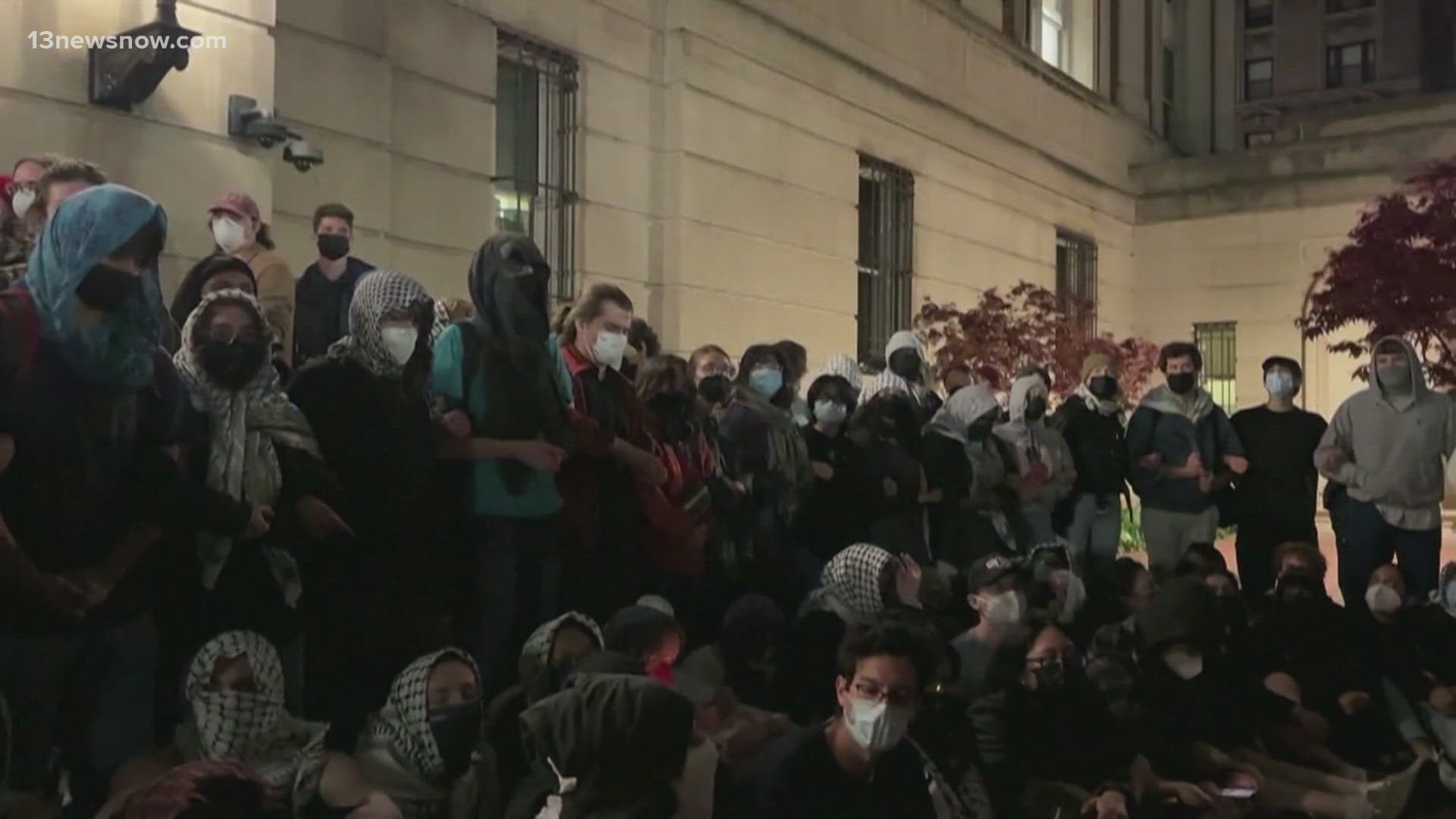NORFOLK, Va. — Student protests over the Israel-Hamas war have popped up at many college campuses following the arrest of demonstrators this month at Columbia University, including at least two in Virginia.
What are the college student protests about?
The nationwide campus protests began as a response by some students to Israel’s offensive in Gaza after Hamas launched a deadly attack on southern Israel on Oct. 7. Militants killed about 1,200 people, most of them civilians, and took roughly 250 hostages. Vowing to stamp out Hamas, Israel has killed more than 34,000 Palestinians in the Gaza Strip, according to the local health ministry.
In response, the students are calling for universities to separate themselves from companies that are advancing Israel’s military efforts in Gaza, and in some cases from Israel itself. Police have arrested hundreds nationwide since early detainments at Columbia on April 18.
Israel and its supporters have branded the university protests as antisemitic, while critics of Israel say it uses such allegations to silence opponents. Although some protesters have been caught on camera making antisemitic remarks or violent threats, organizers of the protests, some of whom are Jewish, say it is a peaceful movement aimed at defending Palestinian rights and protesting the war.
The plight of the arrested demonstrators has become a central part of protests, with students and a growing number of faculty demanding amnesty for protesters. At issue is whether the suspensions and legal records will follow students through their adult lives.
The growing protests come as the academic year is winding down. Students have dug in at several high-profile universities, including Columbia University and University of Texas at Austin. Standoffs appeared to be coming to a head late Monday and early Tuesday as police cleared encampments and arrested demonstrators at many campuses.
As cease-fire negotiations appeared to gain steam on Tuesday, it wasn't clear whether those talks would inspire campus protesters to ease their efforts.
Pro-Palestine protests in Virginia
In Virginia, a weekend protest at Virginia Tech in Blacksburg resulted in 82 arrests, including 53 students, a university spokesperson said Monday.
VT protesters occupied the lawn of the Graduate Life Center on Friday. After protesters took further steps to occupy the lawn and outdoor spaces Sunday, the university advised those gathered to disperse. Those who failed to comply were warned they would be charged with trespassing, the university said.
Over in Richmond, police in riot gear at Virginia Commonwealth University sought to break up an encampment there late Monday, clashing with protesters and deploying tear gas and zip-ties to take protesters into custody.
From the Civil Rights Movement to Kent State to Occupy Wall Street, a long history of college activism
Massive protests and demonstrations on college campuses are not a new phenomenon. Dr. Michael English, who is the Peace, Conflict and Security Program Director at CU Boulder, tells our sister station KUSA that student protests surrounding everything from the Civil Rights Movement to the Vietnam War and Occupy Wall Street have filled college campuses for decades.
Students are active, they're educated, and if they feel their opinion is being ignored, English said, they're willing to push back on big issues.
"I think if you look back at the 1960s, there are certainly a lot of parallels in terms of the frustration young people are feeling at the slow pace of change," he explained.
Those protests of the 1960s and early 1970s often saw heavy-handed responses from law enforcement, culminating in the deadly Kent State University shootings on May 4, 1970. Students were protesting the Vietnam War when members of the Ohio National Guard opened fire, killing four students and injuring nine others.
English said that in the 1980s and 1990s, police traded their riot gear for their uniforms, engaging with demonstrators. But that changed after the 9/11 terrorist attacks. Since that time police have been remilitarized and arrests at protests are growing common.
"I think for a lot of people who remember the 1960s and '70s, what they tell me is the sights of police on college campuses in the riot gear is very reminiscent of that time," English said. "And so we seem to have a lost a little bit of the knowledge we gained from the 1960s and '70s that perhaps a policing first response isn't the most appropriate way to deal with peaceful protest."
English said while an institution's response can inflame tensions or reduce them, protesters have proven over the decades that utilizing this constitutional right can help spark a dialogue, even change.

